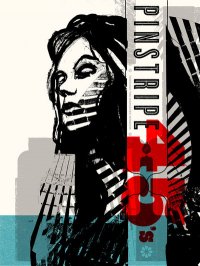Videos by American Songwriter
Ah, the soft anthem. With so many musical trends from the ‘80s being revisited these days, the UTR staff had been wondering when someone might attempt to reinvent that particularly pillow-y yet aggressive celebration of broken hearts. Any fan of criminally underrated bands like Supertramp and Air Supply might also have felt a certain dearth of truly tender-yet-brave musical moments over the past decade. It’s been as if no one understands us anymore. Like a panoramic jib crane shot of a hardened general surveying a battlefield of fallen soldiers at the end of a war film, the soft anthem has the ability to translate epic suffering in a very personal language. In these days of catastrophic natural disasters and ruined economies, we knew it could only be a matter of time before a new group would come along to put a fresh spin on the formula.
Upon listening to our advance copy of Pinstripe 45’s Through The Darkened Window (Crying Icon), we knew that the wait was over. After discarding empty boxes of Kleenex and crumpled cartons of frozen yogurt, we set about the hard task of analysis.
Pinstripe 45’s version of the soft anthem is both enigmatically modern and earnestly retro. Producer-of-the-moment Jacquire King’s minimal production touches propel the songs beyond sentimentality, but the band’s finger-picked guitars and doubled harmonies go all the way back to Simon and Garfunkel, Tim Buckley and the heady fragrance of clove cigarettes. Marshall Hanbury, Jr.’s lead vocal wavers with an epileptic vibrato and slightly Continental vowel twisting that hints at something out of proportion and possibly epic. (For example, when Hanbury sings, “Oh girl,” it sounds a lot like “Olga.”) The frequent layering of bassist Gina Black’s harmony vocal only expands the possibilities, creating an achingly familiar sensation that inspired at least one UTR staff member to reach for a tambourine. Simply put, Hanbury and Brown’s vocals sound a lot like the Carpenters on Ambien—no small feat for a band from Chicago.
Through The Darkened Window’s song titles are deliciously dramatic, as well: “Because She Waits,” “Even When You Cry,” “Run From Me” and “When I Lie To You” provide a strong idea of the sort of emotional terrain in which Pinstripe 45’s feel most comfortable. The best distillation of their efforts may be the elegiac “I Love You, Ilene,” a soft-focus romance that deserves a prime spot in the next Wes Anderson movie, underneath the bicycle chase scene, right between Cat Stevens and Petula Clark.
Inga Swearingen’s melodies unfold like Virginia Woolf’s best sentences, patiently building to an expected climax before transcending it like a sweet exhalation of air. First Rain (Rhythome), her newest release, is an exquisitely crafted piece of work that delicately interweaves jazz and folk into a most uncommon singer/songwriter album. Although Joni Mitchell may be her most obvious touchstone, Swearingen possesses the musical chops and intuition to step out of Mitchell’s considerable shadow and into a place all her own. First Rain includes several stellar versions of standards (a Monk-ish take on “Blackbird” is particularly excellent), but Swearingen’s original compositions, in which she utilizes the complexities of jazz harmonics to bring out the emotional undercurrents of her still life observations, are the most inspiring of the collection.
Walter Rose’s new eponymous EP (4th St. Records) swells with enough warm, smoky ambiance to bring tears to the eyes of a hardened convict. Rose’s songs are melodic novellas of road trips through broken-down desert towns, the kind of stories that bring to mind tumbleweeds blowing through old Clint Eastwood movies. In fact, the entire recording sounds as if it could have been released in 1975, the sort of thing that might come crackling out of a road house jukebox in Barstow. Its flat, analog spectrum lends plenty of warmth to the nooks and crannies of Rose’s weathered delivery while showcasing the subtle dexterity of his backing musicians. There is no sparkle or fairy dust here; just long, open stretches of lonely highway winding into purple sunsets and swells of pedal steel, the perfect setting for Rose’s endless journeys in search of home.








Leave a Reply
Only members can comment. Become a member. Already a member? Log in.